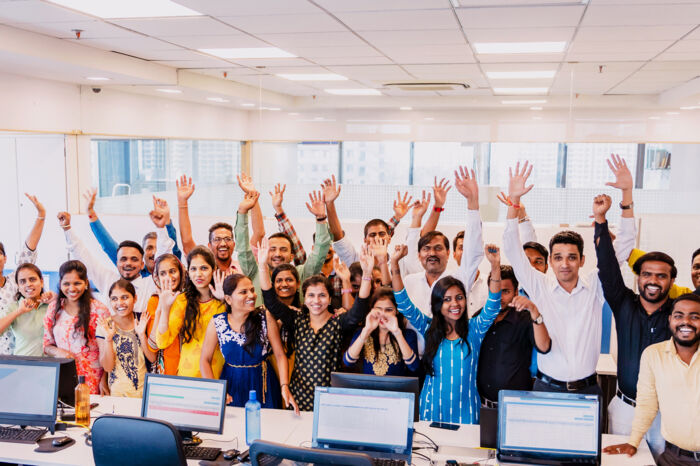
Encouraging collaboration and teamwork
The notion that teamwork is important to a company's success is not a new one, but the need to continually encourage it in the workplace is still hugely relevant. Effective collaboration between teams and departments helps people gel and feel part of a large work family.
Team-building activities like regular lunches, drinks, outings, and structured exercises can work well. Your talent retention strategy might also include designing office spaces to encourage collaboration, such as break-out rooms, open-plan areas, and communal workspaces. The easier it is for your team to work cohesively, the better.
Offer competitive compensation and benefits
It goes without saying that top talent is often attracted to companies that pay the highest salaries. As such, offering competitive salaries needs to be a priority. The simplest way to ensure you're paying at the right level is to benchmark the salaries you offer against what your competitors are paying for similar roles.
Of course, salary is only one element in any compensation package, meaning that offering robust benefits is equally important. That means you should be looking at providing your employees with comprehensive health insurance, retirement plans and possibly even wellness programs. Perks like these are often expected and can have a big, positive effect on your staff turnover rates.
Offer excellent career development opportunities
The last thing you want is for your employees to feel like they have to move to a different company in order to progress their careers. That's why any good talent retention strategy needs to include plenty of opportunities for professional development and progression.
Schemes like Continuous Professional Development (CPD) and mentorship can be very helpful in motivating employees to stay and grow with you.
Ensuring your employees enjoy a good work-life balance
Another aspect that any effective talent retention program needs to prioritise is ensuring that your employees enjoy a good work-life balance. The key to having a healthy, productive, and engaged workforce involves giving people space to breathe, as they're far less likely to experience fatigue, burnout, and stress.
Even the most dedicated employees need downtime, and it's essential to a person's well-being and overall job satisfaction. Rested people are typically more positive and enjoy higher levels of morale, and a strategy that focuses on it fosters loyalty and mitigates absenteeism.
A range of measures can be introduced to this effect, including:
- Compressed workweeks—Working extended hours each day can allow employees to enjoy a longer weekend and spend more quality time with their families.
- Remote work options—It's never been easier to work off-site, and doing so spares your staff the stress of commuting when it might not always be needed.
- Flexible working hours—Allowing employees to decide when they work their allotted hours is a valuable ability that also improves job satisfaction and overall contentment.
Companies known for facilitating flexible working options conducive to striking a healthy balance are certainly more attractive to top talent and can give you a significant advantage over your competitors. It's also a great way to keep your existing employees happy, motivated and committed to the cause.
Effective leadership and management
The best employee retention practices have great leaders at their core. Working on the front line, they're crucial in fostering a positive work environment while encouraging engagement and loyalty. As such, you must provide leadership training covering the main competencies like team development, communication and conflict resolution.
When managers communicate transparently, openly, and honestly, they breed trust and credibility while making employees feel informed and valued. This also helps manage expectations and foster a sense of security and belonging.
Conflict management is also a critical part of talent retention, as it ensures that team disagreements are dealt with fairly and swiftly, preventing good people from leaving your organisation unnecessarily.
Holding onto your best people with the best employee retention practices
As we've covered, holding onto your best people is not just about paying the best salaries. While compensation does play its part in your overall ability to attract and retain the best talent in your industry, a well-constructed talent retention strategy must also focus on effective leadership, career development, recognition for a job well done and the provision of a fair and equitable workplace.
At MCI, we have the experience and expertise needed to create an employee engagement strategy that allows organisations to develop positive workplaces that foster loyalty and ensure people don't want to leave.
To find out more about us and what we're able to do, take a look at our full range of services that cover all aspects of engaging and inspiring people. Alternatively, why not get in touch with our team today? We'll make every effort to show you from the first moment that your success is at the centre of everything we do.




